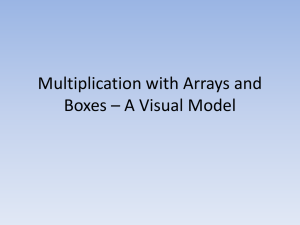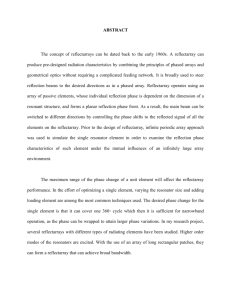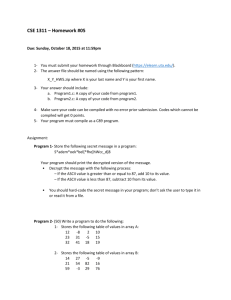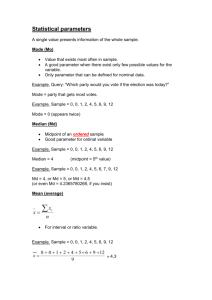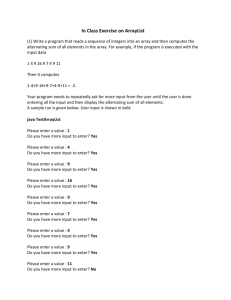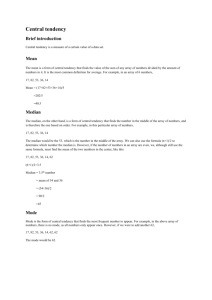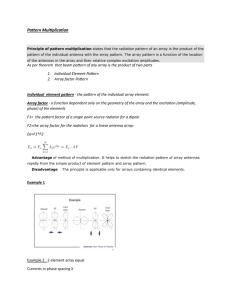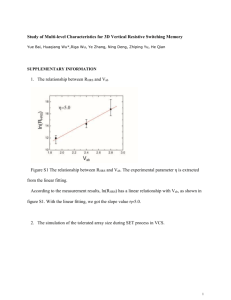COMPUTER SYSTEMS RESEARCH Code Writeup of your program
advertisement
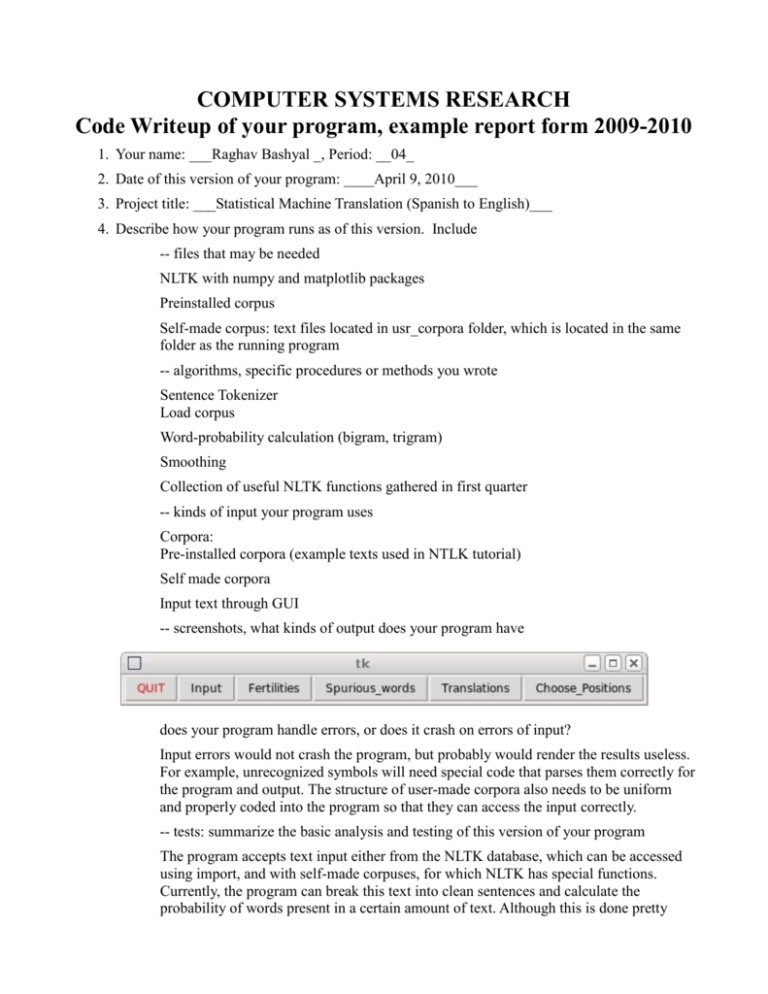
COMPUTER SYSTEMS RESEARCH
Code Writeup of your program, example report form 2009-2010
1. Your name: ___Raghav Bashyal _, Period: __04_
2. Date of this version of your program: ____April 9, 2010___
3. Project title: ___Statistical Machine Translation (Spanish to English)___
4. Describe how your program runs as of this version. Include
-- files that may be needed
NLTK with numpy and matplotlib packages
Preinstalled corpus
Self-made corpus: text files located in usr_corpora folder, which is located in the same
folder as the running program
-- algorithms, specific procedures or methods you wrote
Sentence Tokenizer
Load corpus
Word-probability calculation (bigram, trigram)
Smoothing
Collection of useful NLTK functions gathered in first quarter
-- kinds of input your program uses
Corpora:
Pre-installed corpora (example texts used in NTLK tutorial)
Self made corpora
Input text through GUI
-- screenshots, what kinds of output does your program have
does your program handle errors, or does it crash on errors of input?
Input errors would not crash the program, but probably would render the results useless.
For example, unrecognized symbols will need special code that parses them correctly for
the program and output. The structure of user-made corpora also needs to be uniform
and properly coded into the program so that they can access the input correctly.
-- tests: summarize the basic analysis and testing of this version of your program
The program accepts text input either from the NLTK database, which can be accessed
using import, and with self-made corpuses, for which NLTK has special functions.
Currently, the program can break this text into clean sentences and calculate the
probability of words present in a certain amount of text. Although this is done pretty
accurately, the range of the program is limited.
The probability calculation (when using trigrams/bigrams) have not been tested through
a corpus.
5. What do you expect to work on next quarter, in relation to the goal of your project for the year?
I expect to implement the main model algorithm for translation (below). This will be my primary goal. I will
also polish up the GUI, integrate corpora, and do testing.
#Model 3
1. For each English word ei indexed by i = 1, 2, ..., 1, choose fertility phi-i with probability
n(phi-i | ei)
2. Choose the number phi-0 of "spurious" French words to be generated from e0 = NULL, using
probability p1 and the sum of fertilities from step 1
3. Let m be the sum of fertilities for all words, including NULL
4. For each i = 0, 1, 2, ...., 1, and each k = 1, 2, ..., phi-i, choose a French word tau-ik
with probability t(tau-ik | ei)
5. For each i = 1, 2, ..., 1, and each k = 1, 2, ..., phi-i, choose target French position
pi-ik with probability d(pi-ik | i, l, m)
6. For each k = 1, 2, ..., phi-0, choose a position pi-0k from the phi-0 - k + 1 remaining
vacant positions in 1, 2, ...m, for a total probability of 1/phi-0!
7. Output the French sentence with words tau-ik in positions pi-ik (0<=i<=1, 1<=k<phi-i)
OUTPUT:
//----- ACCESS PRE-INSTALLED COPORA ------ //
*** Introductory Examples for the NLTK Book ***
Loading text1, ..., text9 and sent1, ..., sent9
Type the name of the text or sentence to view it.
Type: 'texts()' or 'sents()' to list the materials.
text1: Moby Dick by Herman Melville 1851
text2: Sense and Sensibility by Jane Austen 1811
text3: The Book of Genesis
text4: Inaugural Address Corpus
text5: Chat Corpus
text6: Monty Python and the Holy Grail
text7: Wall Street Journal
text8: Personals Corpus
text9: The Man Who Was Thursday by G . K . Chesterton 1908
// ----- ACCESS USER-MADE COPORA ------ //
['hello', 'my', 'name', 'is', 'hello', '.']
my
name
Hello. My name is Jorge. I am a student at Thomas Jefferson High School for Science
and Technology. I like to dance. What is your name?
Hola. Me llamo Jorge. Yo soy una estudiante en Thomas Jefferson Escuela Secundaria
para Ciencia y Tecnologia. Me gusta bailar. Como te llamas?
// ----- TOKENIZE ------ //
<type 'str'>
['In the wild events which were to follow this girl had no\npart at all; he never saw her
again until all his tale was over.',
...]
In the wild events which were to follow this girl had no part at all; he never saw her
again until all his tale was over.
// ----- PROBABILITY CALCULATION (WORD: citizens) ------ //
0.00157820701959
CODE
import nltk;
from nltk.tokenize import *;
from nltk.corpus import PlaintextCorpusReader;
import pprint;
from array import array;
from nltk.book import *;
from string import *;
corpus_root = 'usr_corpora';
wordlists = PlaintextCorpusReader(corpus_root, '.*');
wordlists.fileids();
#prints out the names of the files (including tags like .txt)
text = wordlists.words('testwords');
#prints out the words in file 'testwords'
print text;
print text[1];
print text[2];
f = open('usr_corpora/simple');
print f.read();
print type(f.read());
sent_tokenizer = nltk.data.load('tokenizers/punkt/english.pickle');
raw_text = nltk.corpus.gutenberg.raw('chesterton-thursday.txt');#f.read();
sents = sent_tokenizer.tokenize(raw_text);
pprint.pprint(sents[171:181]); # import nltk, re, pprint
#make all \n's into spaces
size = len(sents);
print size;
def removeline(st):
newstr = '';
for char in st:
if char != '\n':
newstr += char;
else:
newstr += " ";
return newstr;
#new_array;
#def removeline_array(newstr):
print removeline(sents[171]);
print split(sents[171]); #python function for splitting string into array of strings
def prob( word, text):
#print len(text);
#print text.count(word);
x = (float)(text.count(word))/(float)(len(text));
return x;
print prob('citizens', text4);
def bigram_x( first, second, text, size): #text = array sentences
b_sum = 0;
t_size = size;
for sent in text:
index = 0;
array_sent = split(sent);
while(index <= len(array_sent)-1):
if index == 0 and array_sent[index] == first:
b_sum = b_sum+1;
if index == len(array_sent)-1 and array_sent[index] == second:
b_sum = b_sum+1;
if index != 0 and index != len(array_sent)-1 and array_sent[index] == first and
array_sent[index+1] == second:
b_sum = b_sum+1;
index = index +1;
#print index;
print "Hey ",index;
return b_sum;
print bigram_x( "wild","events", sents, size);
def bigram_prob( first, second, text, size): #text = an array of sentences
# b(y|x) = num of occ. of "xy" / num of occ. of "x"
xy = (float)(bigram_x(first, second, text, size));
x = (float)(count(first, text));
print "x ",x;
return xy / x;
def count( word, text): #count number of occurrences of word in text, which is an array of sentences
ct = 0;
for x in text:
if word in x:
ct += 1;
return ct;
print 1/size;
print bigram_prob("wild", "events", sents, size);
# Porbability of entire sentence
def prob_sent(sent): #returns probability of a sentence
# take bigrams
# for first and last cases, devise plan
# start of sentence - send space
# end of sentence is a period - send space
def trigram_x_with_markers(first, second, third, text, size):
b_sum = 0;
t_size = size;
for sent in text:
index = 0;
array_sent = split(sent);
while(index <= len(array_sent)-3):
if array_sent[index] == first and array_sent[index+1] == second and
array_sent[index+2] == third: #x, y, z
b_sum = b_sum+1;
index = index +1;
#print index;
print "Hey ",index;
return b_sum;
def trigram_x( first, second, third, text, size): #text = array sentences
b_sum = 0;
t_size = size;
for sent in text:
index = 0;
array_sent = split(sent);
while(index <= len(array_sent)-3):
if index == 0 and array_sent[index] == first: #start of sentence, s.o.s., x
b_sum = b_sum+1;
if index == 0 and array_sent[index] == first and array_sent[index+1] == second:
#sos, x, y
b_sum = b_sum+1;
if index == len(array_sent)-3 and array_sent[index+2] == third: #z, end of
sentence, e.o.s.
b_sum = b_sum+1;
if index == len(array_sent)-3 and array_sent[index+1] == second and
array_sent[index+2] == third: #y, z, eos
b_sum = b_sum+1;
if array_sent[index] == first and array_sent[index+1] == second and
array_sent[index+2] == third: #x, y, z
b_sum = b_sum+1;
index = index +1;
#print index;
print "Hey ",index;
return b_sum;
# Porbability of entire sentence
def prob_sent(sent, text, size): #returns probability of a sentence
# take bigrams
# for first and last cases, devise plan
# start of sentence - send space
# end of sentence is a period - send spa
product =1;
# loop from first to last-3
index = 0;
while ( index <= len(sent)-3):
trg = trigram_x(sent[index], sent[index+1], sent[index+2], text, size)/
bigram_x(sent[index],sent[index+1], text, size)
#trigram_p (xyz) = trigram_x(xyz) / bigram(xy)
product = product * trg;
index = index +1;
def trigram_x_smooth(first, second, third, text, size):
#0.95 * trigram_x +
#0.04 * bigram_x +
#0.008 * probability of z +
#0.002
def smooth_prob_sent(sent, text, size, ARRAY):
#ARRAY has smoothing coefficients
product 0;
index = 0;
while ( index <= len(sent)-3):
trg = ARRAY[index] * trigram_x(sent[index], sent[index+1], sent[index+2], text, size)/
bigram_x(sent[index],sent[index+1], text, size)
prob = trg+prob;
index = index +1
probability of a model:
P( model | test-data) = P(model) * P(test-data | model) / P(data)
^ P(test-data | model) = P(test-data)
perplexity of the probability of model (the smaller, the better):
perp = 2 ^ (-log( P(e) ) / N)
log probability:
log(P(e)) = log( f1 * f2 * f3 *...* fn) = log(f2) + log(f3) ... log(fn)
